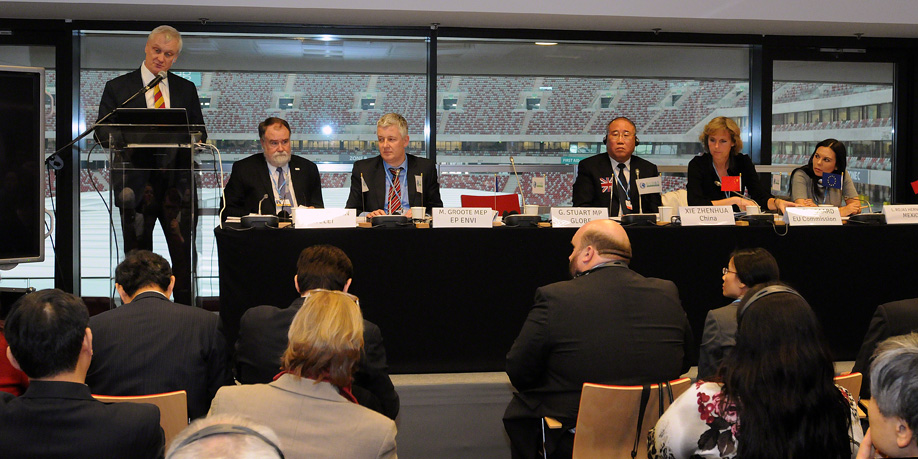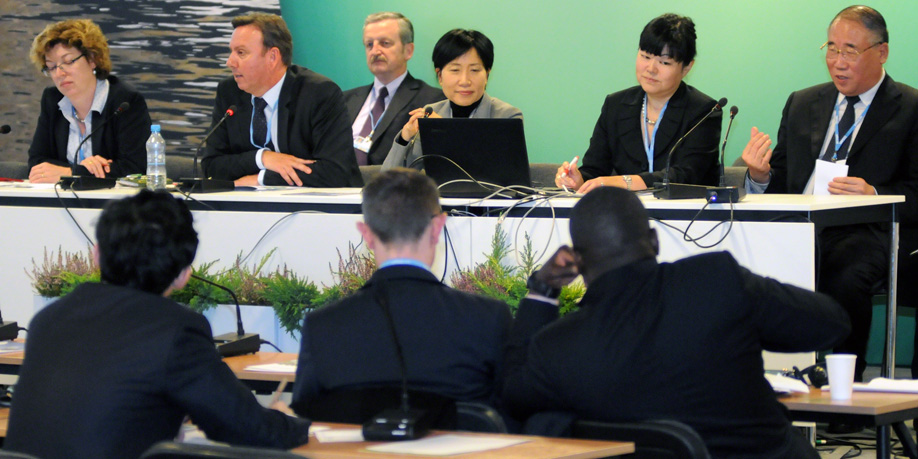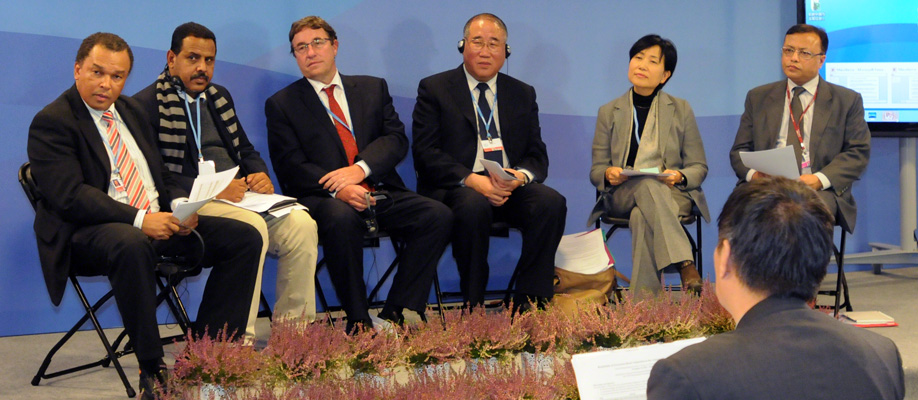 |
 |
 |
 |
Daily web coverage
(click on the following links to see our daily web pages)
|
|
|
|
 |
 |
 |
 |
|
Graham Stuart, Chair, GLOBE International, and Member, House of Commons, UK, co-chaired the side event, together with Mattias Groote, Member, European Parliament (MEP). Stuart highlighted national legislation addressing climate change is proceeding at a rapid rate both in developed and developing countries. Groote highlighted ongoing negotiations in the European Parliament on climate legislation, such as including the aviation sector in the EU Emission Trading System (EU ETS).
Noting the need to be “politically sensitive” concerning the EU’s 28 member states, Connie Hedegaard, European Commissioner for Climate Action, stated that the EU is on track to meet or exceed its 2020 targets while working on its 2030 targets, in part through regulations and tools such as building regulations. Hedegaard noted targeting specific sectors, notably the health sector, informational communication and technology and the “green sector” through competitiveness and job creation with, inter alia, a focus on energy efficiency, waste handling and recycling.
Xie Zhenhua, Vice Chairman, National Development and Reform Commission (NRDC), China, stressed the need to move towards action, such as improving mutual trust, and noting that mutual trust is the basis for multilateral processes. Discussing national climate change legislation and a national climate change adaptation strategy, Zhenhua underscored current efforts in the renewable energy sector, and related energy saving and renewable energy laws.
Daniel Vittori, UNFCCC Secretariat, stated that national legislation is part of the solution for climate action.
Stating that cities play a role in addressing climate change, David Cadman, President, ICLEI, emphasized several initiatives: the Cities for Climate Protection (CCP) campaign; the World Mayor’s Council on Climate Change; the Mexico City Pact which addresses measurement, reporting and verification (MRV) at the city level; ICLEI’s “Carbonn” Cities Climate Registry (cCCR) for global reporting on local climate action; and work on adaptation and resilience via the Resilient Cities Network. He applauded efforts in the Ad Hoc Working Group on Durban Platform for Enhanced Action (ADP) to acknowledge subnational, and local governments and non-state actors.
Laura Rojas Hernández, Senator, Mexico, acknowledged historic efforts leading to legally-binding climate legislation in Mexico, including the 2007 National Climate Change Strategy, which addresses mitigation and adaptation and the 2010 General Law on Climate Change. She highlighted the need for clear objectives, integration across policy fields and financial support, while stressing investments in renewable energy and clean technology and the establishment of a national institute on ecology and climate change.
|
 |  |  |  |

|
Panel (L-R): Graham Stuart, Chair, GLOBE International; David Cadman, President, ICLEI, and Member, House of Commons, UK; Matthias Groote, MEP;
Xie Zhenhua, Vice Chairman, NRDC, China;
Connie Hedegaard, European Commission for Climate Action; and
Laura Rojas Hernandez, Senator, Mexico.
|
|  |  |  |  |
|
UNFCCC Executive Secretary Christiana Figueres welcomed participants, reminding them to keep their feet on the ground and their eyes to the stars. She framed the session by encouraging all to speak from the heart and share their dream of the world they want, highlighting her vision of a world in which men and women walk together hand in hand.
Bianca Jagger, Founder and Chair, Bianca Jagger Human Rights Foundation, called for an end to all violence towards women. She expressed that the skills, knowledge and leadership of women are indispensable to environmental protection.
Lakshmi Puri, Deputy Executive Director, UN Women, shared her dream to change the living reality of all women to one where women have an equal voice in decision-making from the household to the global stage. She added that empowered women are the force multiplier for sustainable development and climate action.
Helen Clark, Administrator, United Nations Development Programme (UNDP), looked to a future where gender equality is accepted, declaring “no decision above us, no decision without us,” where women are not intimidated by fear or actuality of violence, because men have changed. She pointed to the climate justice agenda as an actionable way to make progress.
Mary Robinson, Former President of Ireland, and President, Mary Robinson Foundation – Climate Justice (MRFCJ), offered an empty chair to any young woman to create an intergenerational dialogue, welcoming Riley McAuliffe to the stage. Robinson spoke on the urgency of imagining, with passion, a future we want in order to create a movement. She called for transformational leadership to do away with subsidies on fossil fuels and kerosene, and commit to accountability.
Tarja Halonen, Former President of Finland, hoped for a world without wars and violence between nations, in nations, or in families. She called for the willingness to build the bridge between the present and future, for example through the post-2015 development agenda.
Riley McAuliffe, Global Voices, expressing gratitude, shared her vision that every woman is not held back from positions of power, especially for women in developing countries.
Elizabeth Njoroge, Executive Director, The Art of Music Foundation, was met by a standing ovation for singing the song written by June Budhooram and composed by Njane Mugambi. She shared her work with youth in disadvantaged neighborhoods in Kenya, expressing hope that all children would one day have equal standing in her orchestra.
During the discussion, several women from around the world shared their dreams, inter alia: for each individual to stand in their own inner dignity; to recognize that perhaps men are the heads of households, but women are the necks and can turn the family in any direction; and to teach their daughters to celebrate being a women and liberate them from the pain and guilt of sexual harassment.
Wanda Nowicka, Member of Parliament, Poland, hoped for a world where all women dare to dream and are able to operationalize those dreams.
|
 |  |  |  |

|
Panel (L-R):
Riley McAuliffe, Global Voices;
Elizabeth Njoroge, Executive Director, The Art of Music Foundation;
Bianca Jagger, Founder and Chair, Bianca Jagger Human Rights Foundation;
Christiana Figueres, UNFCCC Executive Secretary;
Tarja Halonen, Former President of Finland;
Mary Robinson, Former President of Ireland, and President, MRFCJ;
Helen Clark, Administrator, UNDP; and
Lakshmi Puri, UN Women.
|
|  |  |  |  |
|
This session, moderated by Adebe Haile-Gabriel, AUC, explored how the implementation of the Comprehensive African Agriculture Development Programme (CAADP) can support climate change adaptation and provide a platform for sharing information and knowledge on past, existing and planned initiatives on climate change adaptation and mitigation.
Tumusiime Rhoda Peace, Commissioner for Rural Economy and Agriculture (REA), AUC, underscored the movement of Pan-Africanism, which aims to “unify and uplift” people of African descent, and addressed the latest Intergovernmental Panel on Climate Change (IPCC) report that notes the adverse effects of climate change on African agriculture. Recalling that Africa is not the main polluter, she called for polluting countries to continue committing to their pledges, so that the trajectory is not undermined.
A panel discussion, moderated by Fatima Denton, UNECA, discussed emerging issues concerning climate change and agriculture. Denton framed the discussion underlying, inter alia: the need to broaden the definition of agriculture; the ways that climate change impacts agriculture and food security; adaptation policies; the need for the right mix of institutions; and the way science and technology may catalyze the needed agricultural transition.
Fred Kossan, AGN, stressed that agriculture lies at the core of the UNFCCC noting that adaptation, which includes agriculture, is very important for Africa. He underlined the potential of National Adaptation Plans (NAPs) to address challenges ahead.
Anthony Nyong, AfDB, said that agriculture should not be seen as a social service, but addressed in its business dimension, and noted that less than 10% of finance go to adaptation strategies. He underscored that climate-smart agriculture (CSA) and low-carbon development are the pathways that should be followed.
Ayalneh Bogale, AUC, addressed the links between agriculture and the environment, calling for an integrated approach. Referring to National Adaptation Programmes of Action (NAPAs), he stressed that institutional fragmentation often impedes successful tackling of challenges in the agricultural sector.
Tom Owiyo, UNECA, African Climate Policy Centre (ACPC), said that considering future productivity challenges, agriculture needs to be seen as something different than a social engagement for the poor and the sum of ecosystem services should be considered. He underscored that while climate change is an important stressor for agriculture, multiple challenges exist and structural problems need to be addressed as well.
In the ensuing discussion, participants focused, inter alia, on including: livestock farming in the equation; water management to address food security; and women subsistence farmers.
|
|
UN Environment Programme (UNEP) Executive Director Achim Steiner welcomed participants. COP 19 President Marcin Korolec highlighted the UN system as a catalyst in mobilizing sustainable development, outlining linkages between the post-2015 development agenda process and negotiations under the ADP. He highlighted the work to be done in the next week towards an ambitious global agreement that addresses the defining issue of our era and ensures it does not undercut sustainable development.
UNFCCC Executive Secretary Christiana Figueres said this has to be the development banks and the UN’s obsession, stressing the world is running out of time. She called for moving to a meaningful and technical draft agreement, calling for “just doing it.”
Helen Clark, Administrator, UNDP, discussed national actions and how to scale-up programmes. She highlighted that countries look to the UN to act in an integrated way, saying that if integrated approaches are being asked of countries, the UN should be asking no less of itself.
World Meteorological Organization (WMO) Secretary-General Michel Jarraud addressed how science can contribute, given the relative imperviousness of policymakers to climate realities. He highlighted the tragic event of Typhoon Haiyan, noting while it cannot be attributed to climate change that it is consistent with what is expected from climate change.
Rachel Kyte, Vice President of Sustainable Development, World Bank, said increasing disasters are bringing climate change over the policy horizon. She stressed that there must be demonstrated flows of public climate finance to leverage private sector investment, adding that it will not matter if trillions and trillions flow in the opposite direction through fiscal policy, such as through pension fund investments and subsidies.
René Castro Salazar, Minister of Environment and Energy, Costa Rica, said transformative change in Costa Rica required extensive changes to legal frameworks, resulting in expansion of natural forests, and extension of electrification, health and social benefits. He said with the help of the UN, his country realized that they could be eco-competitive and provide better lives for its people.
Henry Verhaar, Philips Lighting, highlighted their leadership on the transition to compact fluorescent (CFL) light bulbs and light emitting diodes (LEDs). He said having all of the players together in an integrated approach was beneficial to ensuring success, stressing successful campaigns require inspiration, aspiration and perspiration.
Jarraud said the past is increasingly misleading in predicting the future due to climate change. He discussed downscaling data and information to the regional and national level to provide policymakers and farmers with concrete information.
UN Secretary-General Ban Ki-Moon thanked participants for their leadership in and commitment to addressing climate change. He expressed condolences to the people of the Philippines, stressing this unexpected disaster is one of many serious impacts of climate change, saying it is not just a wake-up call but an alarm bell calling for urgent action. He said the IPCC 5th Assessment Report (AR-5) provides more clarity on the challenges of climate change, calling on nations to “just act.”
|
|
William Ernest Ehlers, GEF, moderated the event.
Acknowledging Super Typhoon Haiyan, Naoko Ishii, CEO and Chairperson, the GEF Secretariat, stressed that we are pushing our ecological system to the limits. Noting GEF’s 2020 Long-Term Strategy and the need for integrated approaches, she urged taking a “drivers” rather than a “symptoms” approach.
Chizuru Aoki, the GEF Secretariat, introduced the proposed GEF-6 Climate Change Mitigation Strategy which includes on multifocal synergistic programmes and cross-cutting integrated approaches. She noted five key topic areas: removal of deforestation from the commodities supply chain; the Amazon Region; sustainability and resilience for food security in Sub-Saharan Africa (SSA); support for rebuilding global fisheries; and sustainable cities.
Zhenhua Xie, Vice Chairman, NDRC, China, acknowledged past support from the GEF while emphasizing the need for capacity and institutional building in developing countries. He encouraged the GEF to play a heightened role on climate finance, while supporting ongoing activities concerning mitigation, adaptation, technology transfer, information sharing and transparency.
Gino van Begin, Secretary General, ICLEI, highlighted that in the next 40 years, urban infrastructure will have to double to accommodate rising urban populations and this infrastructure should be developed in a holistic and integrated way, especially within medium-sized cities where most growth is expected to occur. He called for directing additional international financing mechanisms towards urban areas.
Identifying the multi-sectoral nature of climate finance, Karin Kemper, World Bank, applauded the focus on “finding synergies” in the GEF-6 Strategy, stating that synergetic approaches make it easier to design interventions and address key development concerns. She pointed to the “Great Green Wall for the Sahara and Sahel Initiative” stating that taking a synergistic approach delivers a better service for World Bank clients.
Ishii asked panelists how the GEF can deliver “tangible items” in local communities where environmental degradation is most pronounced. She then opened the floor to discussion on: the price of carbon; the Clean Development Mechanism (CDM) as an effective instrument to leverage finance; capacity building; a focus on transparency; the importance of data; policy and regulatory framework developments; and the technological gap.
|
 |  |  |  |

|
Panel (L-R):
Karin Kemper, World Bank;
Gino van Begin, Secretary General, ICLEI;
William Ehlers, the GEF Secretariat;
Naoko Ishii, CEO and Chairperson, the GEF Secretariat;
Chizuru Aoki, the GEF Secretariat; and
Zhenhua Xie, Vice Chairman, NDRC, China.
|
|  |  |  |  |
|
This side event, moderated by Emira Fida, UNEP, focused on: sharing knowledge, good practices and policy options on EBA; mainstreaming EBA into NAPs; and promoting South-South cooperation on climate change under the umbrella of the UNFCCC.
Xie Zhenhua, Vice Chairman, NDRC, China, noted China’s efforts to address environmental challenges while maintaining economic growth. Pointing to recent results and co-benefits, he stressed that addressing climate change will not impede economic development. Zhenhua also stressed that South-South cooperation opportunities should be further explored and the GEF’s work in China should be replicated to produce multiplication effects.
Achim Steiner, Executive Director, UNEP, said that EBA in the context of South-South cooperation creates a new frontier in terms of addressing climate change. He underscored that the international ecosystem management approach constitutes a pioneering project with significant potential.
Naoko Ishi, CEO and Chairperson, the GEF Secretariat, stressed the importance of EBA, noting that countries are moving from NAPAs to NAPs. She discussed China’s eco-civilization as an innovative way to move forward, adding that China has much to offer through South-South cooperation.
Sidi Mohamed El Wavi, Mauritania, provided insight from an adaptation case study to combat desertification in Mauritania, noting that the projects under the GEF, UNEP and NDRC in the pilot countries constitute an excellent example that should be followed, strengthened and developed.
Addressing the Nepalese experience on the adaptation initiative for vulnerable mountain ecosystems, Prakash Mathema, Nepal, noted that the EBA is a cost-effective way of adapting, learning from and restoring nature that is accessible to all.
Will Agricole, Seychelles, stressed that climate change risk management objectives should be incorporated in the development agenda. He further stressed the importance of securing international and South-South cooperation to finance climate change adaptation, providing examples relevant to Small Island Developing States (SIDS).
Discussions focused on the key challenges that EBA projects face during the implementation period. Rawleston Moore, the GEF Secretariat, Keith Alverson, UNEP, Liu Yanhua, China, and Batu Krishna Uprety, Nepal, joined the panel pointing to a lack of capacity building, and information and scientific knowledge as the key challenges.
|
 |  |  |  |

|
Panel (L-R):
Will Agricole, Seychelles;
Sidi Mohamed El Wavi, Mauritania;
Achim Steiner, Executive Director, UNEP;
Xie Zhenhua, Vice Chairman, NDRC, China;
Naoko Ishi, CEO and Chairperson, the GEF Secretariat; and
Prakash Mathema, Nepal.
|
|  |  |  |  |
|
Moderator Simon Upton, Organisation of Economic Cooperation and Development (OECD), opened the interactive session on fossil-fuel subsidy reform by acknowledging the accretion of policies that have embedded fossil-fuel use in society, calling for synchronized subsidy removal.
Tim Groser, Minister of Trade and Minister for Climate Change Issues, New Zealand, explained that overcoming subsidies is a process requiring transparency to raise political awareness. He said that the slow embedding of the concept into political awareness will lead to integration into formal frameworks and government cooperation.
Rachmat Witoelar, President’s Special Envoy for Climate Change, Indonesia, discussed challenges in transitioning from an oil exporting to importing country. He shared some of the complications related to withdrawing subsidies in Indonesia, underscoring the importance of governance and communication in rolling out new policies.
Laura Cozzi, International Energy Agency (IEA), outlined the IEA’s contribution to transparency, highlighting the growing trend of countries to subsidize oil. She reported projections that Gulf countries will be the third largest oil consumers by 2035, while commenting that China is doing “an exceptional job” at deploying energy efficiency on the industrial level. She highlighted market distortion, including that 8% of emissions are currently being taxed, while 16% of emissions are incentivized through subsidies.
Anna Czajkowska, Bloomberg New Energy Finance, reflected that although renewable energy companies have typically lobbied for their own subsidies in order to create a level playing field, it might be wise for these companies to consider lobbying for a removal of all subsidies.
In ensuing discussion, panelists engaged with the audience to consider: whether consumption or production subsidies are more urgent; how to build capacity to overcome social challenges, such as direct cash transfer to mitigate the impact of reducing direct subsidies; and ways to relate to current climate negotiations and utilize emerging data to influence the political environment.
|
|